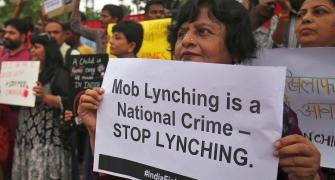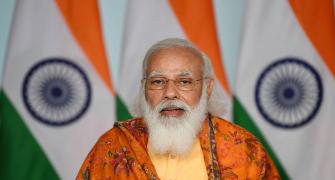The Opposition parties need to spell out how exactly they will protect the citizen from government excess, asserts T N Ninan.

Here's a test for the Opposition: How many of the Bills passed by Parliament, despite opposition from the parties that have joined hands in a new alliance, would these parties undo if they were elected to office, say, in the 2024 general elections.
Would they, for instance, reinstate the Chief Justice in the panel for selecting election commissioners.
Or modify any of the four labour codes that have led to outcomes like the sharp increase in the employment of contract labour by large employers.
And would they amend or repeal the Citizenship (Amendment) Act?
If the Opposition wants to offer a different approach to political and economic issues, it would need to spell out how and what.
For instance, Opposition parties criticise the use or misuse of the government's investigative agencies, including the Central Bureau of Investigation and the Enforcement Directorate.
But when the CBI was called a 'caged parrot' it was the Congress that was in power.
So has the party seen the light, so to speak?
More broadly, what would be the Opposition's agenda for action to ensure the autonomy of Constitutional bodies, or to prevent the misuse of provisions for Money Bills?
Or take the laws on national security. The Maintenance of Internal Security Act was abolished by the Janata Party government because of its rampant misuse by the Congress during the Emergency in the mid-1970s.
Its successors, the Terrorism and Disruptive Activities Act (TADA) and the Prevention of Terrorism Act (POTA), were also repealed, this time by Congress-led coalitions, again because of widespread misuse.
Given this history and experience, would the Opposition do something about the Unlawful Activities (Prevention) Act to prevent its misuse (against political critics, say) without sacrificing national security?
On Constitutional matters, the Opposition needs to be put to the test on the sincerity of its protestations -- say, on Jammu and Kashmir.
The fact is that the abolition of Articles 370 and 35A of the Constitution has broad acceptance outside J&K, and may even have been accepted in a spirit of resignation as fait accompli in that Union Territory.
Would the Opposition really want to turn the clock back, other than to restore J&K's statehood?
Especially on social issues, frequently one cannot turn back the clock -- reservations. Would the Opposition change the cow protection laws?
And are they really against a Uniform Civil Code, appropriately framed?
Or is the voicing of opposition merely for the record, because Muslims fear that such a code might target them.
Do note that the Opposition is already tip-toeing around the issue, careful not to commit itself.
It is pertinent to recall that the conservative elements who in the 1950s opposed Nehru's changes to Hindu personal law (on the grounds, among other things, that the government should not touch laws and practices handed down from Vedic times) would not dream of undoing those changes today because it would quite simply be retrograde.
Substitute Vedic times with the Shariat and listen to the conservative echo.
On the misuse of power by governments at the Centre and in the states, the difference between parties is often one of degree, although the Bharatiya Janata Party has been unique in the single-mindedness with which it has muted critical voices.
It is ironic that it was the Janata Party (into which the Jan Sangh, the BJP's previous incarnation, had merged itself) which in the 1970s set up a Prasar Bharati, which was to be autonomous of the government.
Today the Opposition parties need to spell out how exactly they will protect the citizen from government excess.
Would it, for instance, review two recent bits of legislation, one on the press and media and another on data protection and privacy?
Both give the government powers that it could easily misuse, and experience shows that if such powers have been given they are misused.
What one can be more confident of, now that Rahul Gandhi has been convicted of criminal defamation, is that the Opposition parties may be more willing than before to remove defamation as a criminal offence, as many democracies have done.
The question is, can the Opposition credibly promise action on issues where there is no such personal history?
Feature Presentation: Aslam Hunani/Rediff.com










